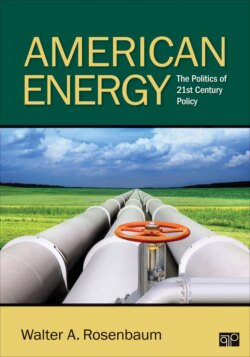Читать книгу American Energy - Walter A. Rosenbaum - Страница 21
На сайте Литреса книга снята с продажи.
Public Opinion
ОглавлениеElective officials work in a culture saturated with sensibility about the public mood and dense with information about public attitudes. Most of the time, however, energy issues hover at the outer edge of public interest, neither compelling attention, nor lapsing into irrelevance to policymaking.37 Between 2009 and 2013, for instance, most national opinion polls seldom, if ever, listed energy among any major issues concerning the public. Public understanding of energy issues confronts public officials with an especially formidable task. Energy management, observes public opinion expert Daniel Yankelovich, is a “unique challenge to policy makers: the combination of a fast-moving, complex problem and a comparatively slow-moving public trying to come to grips with it.”38 It usually requires an international crisis, a dramatic media event, or a powerful economic shock to the consumer’s pocketbook to compel public attention to energy matters.
Gas pumps have become a national public warning system about energy affairs. The pump price of gasoline will most readily connect the public with energy policy. “When it comes to energy prices,” writes economist Jon Krosnick, “voters are likely to think the same way—they are likely to blame the White House at least partly for gas prices across the country but not for their own personal pain at the pump. So a person’s vote is likely to be influenced by perceptions of the nation’s gas prices and efforts to reduce them. People will debate many questions— ‘Why exactly are gas prices as high as they are? Is it the speculators? Is it the supply? Is it the war in Iraq?’ And the more they see the White House as having responsibility for current national conditions, the more people will vote accordingly.”39
Even when Americans react with barometric sensitivity to short-term fluctuations in domestic petroleum prices, energy affairs are otherwise low on the scale of public issue concerns. In 2011, for example, at a time when retail gasoline prices were approaching $4.00 a gallon, “energy” ranked well below ten other issues in the public’s issue priorities, and global climate change, perhaps the most constantly discussed energy issue by public media in the last five years, ranked next to last.40
